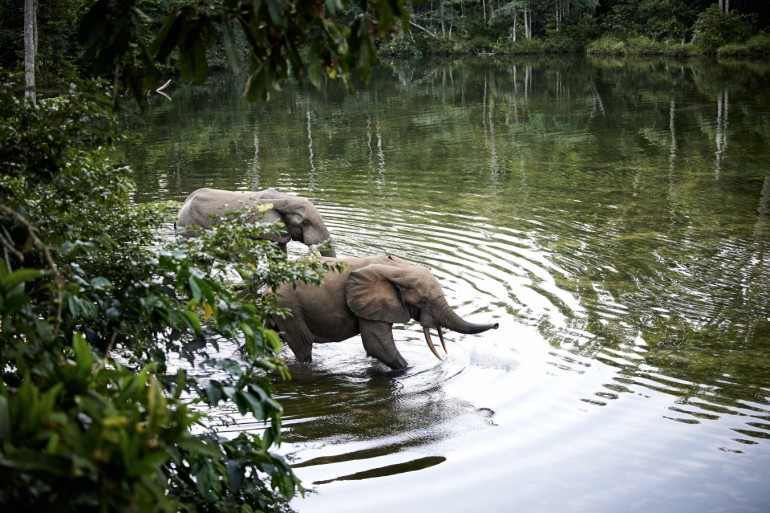Link(s) :


As announced by the World Conservation Society (WCS), inclusion of Djéké triangle, a 95 square kilometer (36 square mile) forest area adjacent to Nouabalé-Ndoki National Park, will benefit wildlife and communities. Find below the WCS article published on this occasion.

The “Djéké Triangle,”an unlogged forest rich in Critically Endangered western lowland gorillas, is now part of Nouabalé-Ndoki National Park. Inclusion of the 95 square kilometer (36 square miles) forest comes after more than 25 years of scientific research in the area, and an extensive community consultation to design a management plan that benefits both the local communities and wildlife.
“The inclusion of the Djéké triangle into the park not only provides protection for this area of high-integrity forest and its unique biodiversity, but also secures the customary rights of the communities to access and benefit from resources they depend on, such as honey or caterpillars, since we are now assured that this forest will remain intact in perpetuity,” explains WCS’s Ben Evans, the park’s management unit director.
Prior to gazettement, WCS spent two years on community consultations in 13 villages and settlements in the area following established standards for obtaining Free, Prior and Informed Consent (FPIC) of Indigenous Peoples and Local Communities. Communities were directly involved in discussing the extension of the Park and identifying areas of cultural and economic importance within Djéké.
This resulted in the inclusion of provisions for a community sustainable use zone for the continued harvest of non-timber products and traditional fishing within the Djéké Triangle. The Congolese Government officially ratified the Park Management Plan on February 10, 2023, certifying gazettement of Djéké Triangle and validating sustainable community use.
"We are not prohibited from activities such as harvesting leaves, mushroom or honey, or fishing, all of which are allowed in the zoning; what we are prohibited from doing is using firearms, and we agree on this because we know that in Djéké there are gorillas habituated to human presence, and if we use guns, we risk disturbing them," said Gabriel Mobolambi, chief of Bomassa village, the closest settlement to the Djéké triangle, during a final community meeting held in late January 2023, following the validation of the FPIC process by the Congolese Government.
The Djéké triangle is an area of global importance for the study of the ecology and behavior of western lowland gorillas, as it is home to Mondika, one of the longest-lasting research sites on this species. Since 1995, three groups of gorillas have been habituated to human presence around Mondika, allowing direct observations of the gorillas in their natural environment. This led to continuous data collection over 25 years, and significant advances in our knowledge of this species, the least well known of the great apes.
The Mondika research site provides stable employment for over 40 people, the majority of whom are indigenous, as well as capacity building opportunities for Congolese researchers, with important investments in women’s leadership. The ongoing development of tourism, with the upcoming construction of several lodges in the vicinity of the Park, will further increase the economic opportunities related to the Djéké Triangle for local populations.
The gazettement of the Djéké Triangle into the Park was made possible by the Park's long-standing collaboration with Olam Agri, the FSC-certified logging company that operates around the Park. Olam Agri has been involved since 1999 in an innovative tripartite agreement with the government and WCS to contribute to the protection of wildlife in the Northern Congo landscape and reduce the impact of logging.
Nouabalé-Ndoki National Park was created in 1993 and expanded in 2012, when the 374km2 Goualougo Triangle, an undisturbed tract of forest harboring chimpanzees which had little or no contact with humans, was added to the Park. Following the addition of the Djéké Triangle, the Park now covers a total of 4334 km2.
"This is an example to follow for the creation and extension of protected areas in the region, which must be done with the best interests of the country, its inhabitants and its wildlife at heart," commented the Minister of Forest Economy, H.E. Ms. Rosalie Matondo.
The Republic of Congo, 60 percent of which is covered by forests, has a dozen protected areas representing 13.36 percent of its territory. This extension comes just a few months after the announcement of the creation of Congo’s first marine protected areas, now covering 12.01 percent of Congo’s Exclusive Economic Zone (EEZ).
***
About WCS Congo
For more than 30 years, WCS has played a major role in the conservation of wildlife and wild places in the Republic of Congo, where it has contributed to the creation, expansion and management of three of the five national parks. WCS works closely with the government, national stakeholders and local communities to protect Congo's rich ecosystems.
About Nouabalé-Ndoki National Park
Nouabalé-Ndoki National Park is arguably the best remaining example of an intact ecosystem in the Congo Basin. It covers more than 4,000 km2 of lowland rainforest and is home to critical populations of endangered mammals, such as forest elephants, lowland gorillas and chimpanzees. Nouabalé-Ndoki was nominated as a World Heritage Site in 2012.
Link(s) :